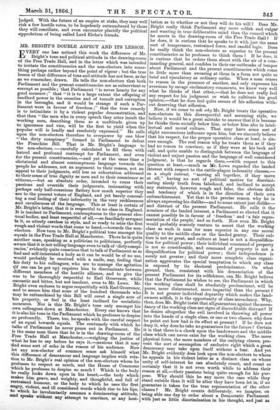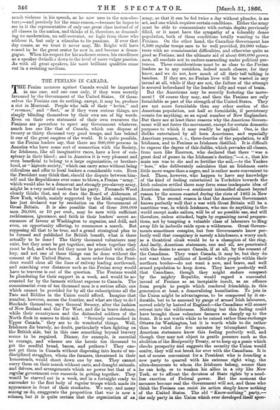MR. BRIGHT'S DOUBLE ASPECT AND ITS LESSON. E VERY one has
noticed this week the difference of Mr. Bright's tone and political attitude in the drawing-room of the Free Trade Hall, and in the letter which was intended to irritate the constituencies and the non-electors into some- thing perhaps rather beyond the point of vigour ; but the true lesson of that difference of tone and attitude has not been, as far as we remember, drawn. He tells the non-electors that both _Parliament and the present constituencies are as subservient or corrupt as possible ; that Parliament " is never hearty for any good measure ;" that " it is to a large extent the offspring of landlord power in the counties and of tumult and corruption in the boroughs, and it would be strange if such a Par- liament were in favour of freedom ;" that the true remedy is to intimidate it by a violent popular demonstration, and that then " the men who in every speech they utter insult the 'working men, describing them as a multitude given up to ignorance and vice, will be the first to yield when the popular will is loudly and resolutely expressed." He calls upon the non-electors therefore to overpower by one blow -" the dirty conspiracy" formed in Parliament to defeat t he Franchise Bill. That is Mr. Bright's language to the non-electors, —carefully calculated to fill them with hatred and profound contempt for Parliament, and even f or the present constituencies,—and yet at the same time a d ictatorial and almost contemptuous language towards the people he addresses, not an argument to their reason, not an appeal to their judgments, still less an exhortation addressed to their sense of true dignity as men and to their conscience as oitizens,—but an absolute order, intended to rouse their -passions and override their judgments, insinuating with perhaps only half-conscious flattery how much superior they are to the present voters of England, and yet barely conceal- ing a real feeling of their inferiority in the very recklessness and cavalierness of the language. This at least is certain of .Mr. Bright's letter, that it is respectful to no class in England. It is insolent to Parliament, contemptuous to the present elec- toml bodies, and least respectful of all,—so familiarly arrogant is it, so utterly careless in style, and so ready to seize the first Tough and violent words that come to hand,—towards the non- -electors. Now turn to Mr. Bright's political tone amongst his equals in the Free Trade Hall at Manchester. There he is quite another man, speaking as a politician to politicians, perfectly aware that it is not telling language even to talk of 'clirtyconspi- -facies,' evidently quite conscious that to talk of Parliament as as bad and self-interested a body as it can be would be of no use, would probably be received with a smile, nay, feeling that ids duty to his colleagues, who are to manage the agitation -(if one can be got up) requires him to discriminate between -different members of the hostile alliance, and to give the cue to be thoroughly respectful to Earl Grosvenor, while 'sarcastic and bitter, but not insolent, even to Mr. Lowe. Mr. Bright even endures to argue respectfully with Earl Grosvenor, and to assure him that none of the hundred thousands who -may be enfranchised by this Bill will covet a single acre of his property, or feel in the least inclined for socialistic measures. Nor is this Mr. Bright's tone only amongst his -own colleagues down at Manchester. Every one knows that it is also his tone in the Parliament which he professes to despise ao profoundly. There, too, be speaks with the careful respect of an equal towards equals. The contumely with which he -talks of Parliament he never pours out in Parliament. He is the same man there that he is in the drawing-room of the Free Trade Hall at Manchester,—weighing the justice of -what he has to say before he says it,—anxious that it may -And some sort of echo in the reason of his audience. Now let any non-elector of common sense ask himself what this difference of demeanour and language implies with rela- tion to Mr. Bright's real opinion of the non-electors whom he professes to respect so much, and the House of Commons -which he professes to despise so much I Which is the body he really looks down upon in his heart,—the body which makes him grave, and weighty, and thoughtful, and full of restrained humour, or the body to which he uses the first angry, violent, and ill considered words which rise to his lips, to which he involuntarily assumes a domineering attitude, and speaks without any attempt to convince, or any hesi- tation as to whether or not they will do his will Does Mr. Bright really think Parliament any more selfish and vulgar and wanting in true deliberative mind than the council which he meets in the drawing-room of the Free Trade Hall ? If he does, it is curious that he speaks to it with just the same sort of temperance, restrained force, and candid logic. Does he really think' the non-electors so superior to the present constituencies as he professes to think them ? If he does, it is curious that he orders them about with the air of a com- manding general, and confides to their ear outbreaks of temper about Parliament and the present constituencies which come to little more than swearing at them in a form not quite so brief and ejaculatory as ordinary oaths. When a man ceases to reason in the presence of another, and only expresses his aversions by savage exclamatory comments, we know very well what he thinks of that other,—that he does not really feel any respect for his judgment or wish to cultivate his good opinion,—that he does feel quite secure of his adhesion with- out deserving that adhesion.
Now, if we come to ask why Mr. Bright treats the operative non-electors in this disrespectful and assuming style, we believe it would be a great mistake to answer that it is because he thinks them socially below him, or below him also in intel- lectual and moral culture. That may have some sort of slight unconscious influence upon him, but we sincerely believe that his respect, for the proper operative class at least, is sin- cere enough. The real reason why he treats them as if they had no reason to convince, as if they were at his beck and call, and quite unable to distinguish between the language of violent and unjust passion and the language of well considered judgment, is that he regards them,—with respect to this question at least,—much as Mr. Lowe regarded the landed interest with respect to the cattle-plague indemnity clauses,— as a single interest, " moving all together, if they move at all," having no sort of political motive for discrimi- nating nicely truth from falsehood, and inclined to accept any statement, however rough and false, the obvious drift and tendency of which is in the direction of their own enfranchisement. Yet that is the precise reason why he is always expressing his dislike—and to some extent just dislike— and distrust of the present Parliament. He calls it the nominee of the landed interest, a Parliament so elected that it cannot possibly be in favour of freedom' and a fair repre- sentation of the people,' and so forth. Now even Mr. Bright would probably scarcely venture to assert that the working class as such is man for man superior in any one moral quality to the middle class or the landed gentry. Their cul- ture is not so great, and culture at least is not a disqualifica- tion for political power ; their individual command of property is not so considerable, and command of property is not a disqualification for political power ; their independence is surely not greater ; and their more complete class organi- zation aggravates the special temptation to which any class is exposed by its electoral predominance. On what ground, then, consistent with his denunciation of the present Parliament for its selfishness, can Mr. Bright believe that the Parliament he wishes to see, the Parliament in which the working class shall be absolutely predominant, will be purer, more disinterested, more impartial than the present I It is not greater individual depravity which makes the land- owners selfish, it is the opportunity of class ascendancy. Why, then, does Mr. Bright insist that all guarantees against the ascen- dancy of the working class are signs of discreditable distrust? If he denies altogether the evil involved in throwing all power into the hands of a single class, or one or two classes, why does he point out how bad is its effect at present I If he does not deny it, why does he take no guarantees for the future V Certain it is that there is a check upon the landowners and the middle class which can never exist for the working class. The mere physical force, the mere numbers of the outlying classes, pre- vent the sort of assumption of exclusive right which a great democracy may take upon itself without a fear. And yet Mr. Bright evidently does look upon the non-electors to whom he appeals in his violent letter as a distinct class on whose unity of self-interest he can absolutely count, and count so certainly that it is not even worth while to address their reason at all,—their passions being quite enough for his pur- pose. Why should this be any more the case while they stand outside than it will be after they have been let in, if no guarantee is taken for the true representation of the other classes Mr. Bright counts deliberately, we imagine, on being able one day to order about a Democratic Parliament with just as little discrimination in his thought, and just as much violence in his speech, as he now uses to the non-elec- tors ;—and precisely for the same reason,—.because he hopes to see in it the representative of only one great class instead of of all classes in the nation, and thinks of it, therefore, as demand- ing no moderation, no self-restraint, no logic from those who address it, but only a stimulus to its passions. If ever that day comes, as we trust it never may, Mr. Bright will have ceased to be the great orator he now is, and become a dema- gogue. When his respect for his audience ceases, his excellence as a speaker dwindles down to the level of mere vulgar passion. As with all great speakers, his most brilliant qualities come out in a _resisting medium.































 Previous page
Previous page